Kids Shouldn’t Have Cancer Foundation aids pediatric cancer research
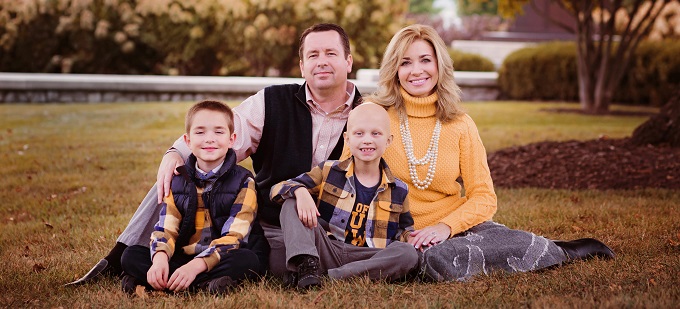
Jonny Wade (center) with his family
By Sharon Reynolds
The Kids Shouldn’t Have Cancer Foundation made a generous $100,000 gift to support pediatric cancer research at UT Southwestern Medical Center’s Harold C. Simmons Comprehensive Cancer Center. The Foundation was created in 2016 to honor the wishes of Jonny Wade, whose strength and courage throughout his own illness inspired people around the world to change outcomes for children with cancer.
In December 2014, 7-year-old Jonny was looking forward to Christmas with his twin brother, Jacky, and his parents, Jon and Kimberly. Jonny was a happy child who loved first grade, spending time with his many friends, and playing video games with Jacky. He began suffering from headaches and in the span of eight days, he was diagnosed with medulloblastoma, the most common type of pediatric malignant brain tumor.
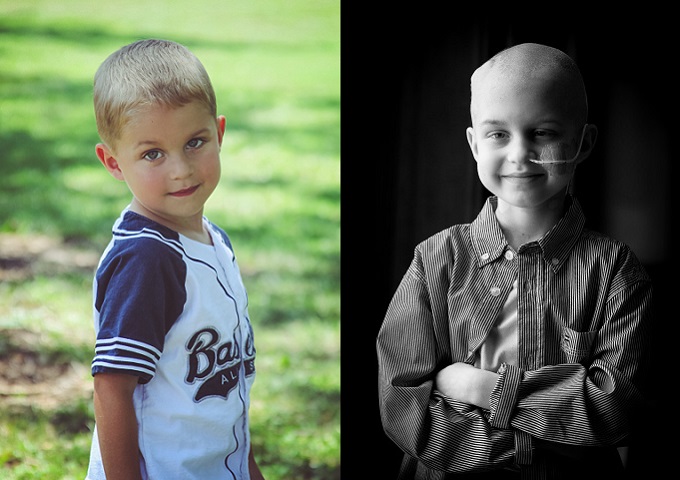
Jonny, age 7 (left) and age 8 (right)
Through 14 surgeries, 30 radiation treatments, and 6 months of intensive chemotherapy, Jonny endured radiation burns, fatigue, daily nausea, vomiting, spinal headaches, and the emotional pain of spending his days in the hospital instead of playing with his brother and friends. One year later on Christmas Eve, he passed away in his family’s arms at the tender age of 8.
“During those 363 days after his diagnosis, Jonny continually said, ‘I don’t want any other kid to have cancer,’” said Mrs. Wade. “He was so selfless and brave. When he was in the hospital, he received many gifts and over time, gave those gifts to other sick kids. We started a Facebook page to update friends and family, and it grew to over 70,000 followers worldwide. Despite the incredible pain and suffering, he remained positive and put others before himself.”
Advocates for change
Childhood cancers are treated differently from adult cancers, yet only 4 percent of federal funding is dedicated to pediatric cancer research. The Wades believe, as a nation, we can do a better job of caring for children with cancer.
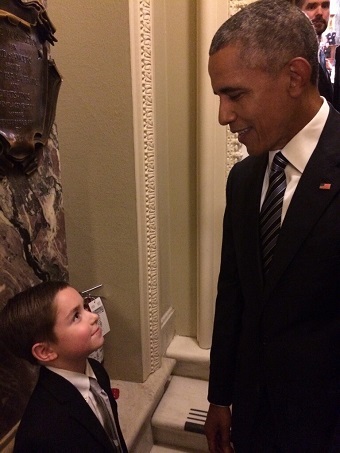
Twin brother, Jacky, meets President Barack Obama at the White House shortly after Jonny's passing
Mr. Wade said, “My child had cancer. He was scared to death, and I was scared to death. I would have taken him anywhere in the world to get the best treatment. It was disheartening that we are using the same poisons we were using 20 or 30 years ago to treat children’s cancer. It was such a gut punch to say, ‘we have the ability to do anything for him, and this is the best we can do.’”
Jonny took every opportunity to advocate for more research dollars through his friendships with congressmen and senators he met while a patient in the hospital. “He would say things like, ‘if you want me to grow up and be a man, you gotta give me a chance to do that. I need more funding. Four percent is not enough to cure kids with cancer,’” said Mr. Wade.
Congressman Rodney Davis invited Jonny and his family to attend the 2016 State of the Union Address in Washington, D.C., but sadly Jonny passed away just two weeks before the event. Jon, Kimberly, and Jacky were there, surrounded by 300 legislators on the floor donning “#teamjonny” wristbands that were grey for brain cancer awareness.
“Jonny had an amazing impact,” said Mr. Wade. “Jacky was actually able to say that he was there on behalf of his brother who had passed away from cancer, and he shook President Barack Obama’s hand. It was a great moment.”
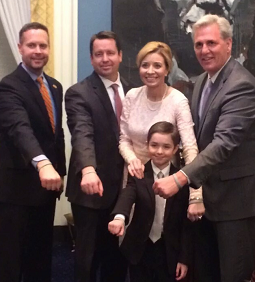
The Wade family with Congressmen Rodney Davis of Illinois (left) and Kevin McCarthy of California (right).
Shortly after Jonny’s death, the family channeled their heartache into hope for others by founding the Kids Shouldn’t Have Cancer Foundation in his memory. The Foundation is dedicated to conquering pediatric cancer through research, political action, and advocacy efforts focused on increasing government funding of pediatric cancer.
Mrs. Wade visits regularly with federal legislators to help push forward new bills for additional funding for pediatric cancer research. In 2016, she helped pass a historic bill to ensure transparency and make the NCI accountable to report their funding activities to the public. Her work will continue until pediatric cancer has been eradicated.
Precision Medicine Program in Childhood Cancer
The Kids Shouldn’t Have Cancer Foundation gift will support the Precision Medicine Program in Childhood Cancer, recently launched by pediatric oncology physician-researchers at UT Southwestern in collaboration with Children’s Health℠. The Program harnesses the power of molecular genetics to identify genetic abnormalities driving an individual child’s cancer. Clinician scientists hope to use a child’s genetic information to guide the use of new, individualized therapies to treat their cancers. Although the program is still in its infancy, exciting examples already show the potential power of such targeted molecular therapy.
“Childhood cancer is often the result of a change or mutation in DNA, resulting in uncontrolled growth and then tumor formation,” said Dr. Laura Klesse, Associate Professor in the Department of Pediatrics at UT Southwestern, who oversees the Precision Medicine Program. “Although the prognosis for childhood cancer has improved over the past several decades, cures continue to elude a significant proportion of children affected. When a cure is possible, current therapies including surgery, radiation therapy, and conventional chemotherapy often come with substantial long term health consequences.”
Through precision medicine, Dr. Klesse and her team hope to understand the genetic changes which have led to tumor formation, target those where possible, and understand future risks to the child. They hope to characterize each child’s individual cancer to help define the risks and prognosis and improve therapy. This gift from the Foundation is vital to moving research forward.
“Our goal is to allow children to grow up, go to college, get married, and live a healthy life,” said Dr. Klesse. “Thanks to philanthropic funding, we can pursue these types of studies. They allow us to push forward not only our understanding of why and how childhood cancer occurs, but how we can improve on our current therapy for not only cure but long term outcomes and quality of life.”
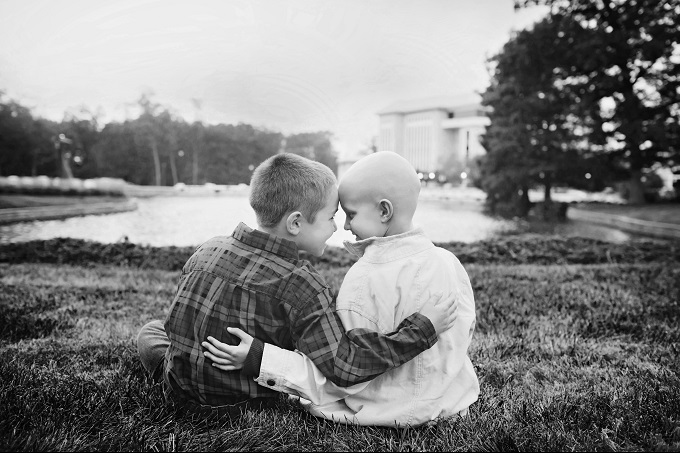
The Wade twins
Moving forward
The Wade family’s tragic story has no happy ending. Mr. Wade said, “We used to imagine what the world would be like if our boys grew up and did great things and all the stuff that would happen. Now we just live one day at a time.”
“We had the All-American dream before Jonny got sick,” said Mrs. Wade. “We had twin boys, lived in a nice home, and had a great life. Since Jonny passed, we deal with the grieving process on a daily basis. It’s been a whole new journey watching Jacky grow up and wondering what Jonny would be like. Jacky has had to learn how to be an only child. He misses his brother deeply and shows it every day. Our family is still healing, but each morning we get up and choose to fight for all the other children out there.”
Childhood cancer doesn’t need to be this way
|
- Only 4 percent of federal funding is dedicated to pediatric cancer research.
- Since 1990, fewer than 10 drugs have been developed to treat pediatric cancer, compared to more than 200 for adults.
- The causes of childhood cancer are largely unknown.
- Many adult cancers can be diagnosed early, but in 80 percent of kids, cancer has already spread to other areas of the body by the time it is diagnosed.
- In the 1950s, almost all kids diagnosed with cancer died. Because of research, today about 90 percent of kids with the most common type of cancer will live. But for many other types, progress has been limited, and for some kids there is still little hope for a cure.
|
Pediatric cancer’s impact on children and families
|
|
A family is never prepared to begin a child’s cancer journey, which creates a negative ripple effect on their lives. Family dynamics, friendships, careers, and a child’s ability to learn, think, and behave can all suffer.
The financial impact of a serious chronic illness can devastate these families as some struggle to provide food, clothing, and shelter for their children. Even if children survive cancer, almost all will suffer chronic health problems in adulthood. For the one in five children who don’t survive cancer, the tragedy of loss changes the lives of their loved ones forever.
|